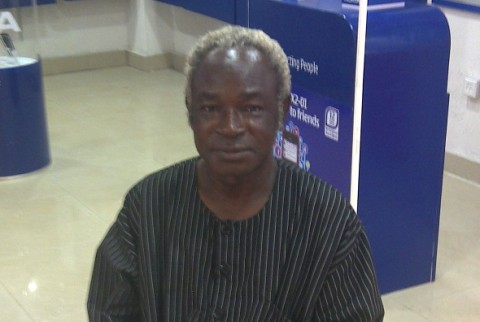Effect of Brain Drain to Africa This Twenty-First Century
Featured Contributors/Columnists, Latest Headlines Friday, August 1st, 2014
By Prof. R. A. Ipinyomi, University of Ilorin, Nigeria
By brain drain we are referring to an international transfer of resources in the form of human capital that is not recorded in any official balance of payments statistics. Brain drain is also simply described as human capital flight. The phenomenon refers to the departure of highly skilled individuals from organizations, industries, and educational institutions. Despite the low level of technical and knowledge skills in Africa the countries in the continent have continued to suffer brain drain. Each year hundreds of thousands of highly skilled Africans seek greener pastures to the USA, Europe, Arabian countries and other developed lands. However we need to be committed to making a difference to the plights of Africans in their own Africa continent this 21st century. Other people worldwide have made inspiring pledges to improve lives and they have been able to collectively change the world for better technologically. It is not too late to intervene in Africa and strengthen our community. We are looking for individuals and organizations that would pledge one or two actions now to build a better future within the African continent in particular.
Brain drain is a major development constraint in terms of development opportunities and lost investment. Brain drain is quite different from low-skilled and migrant workers stealing their way to other lands. However both have similar results because in both cases excellently healthy and able bodied (those that could have been most useful in the workforce) are involved in the human flight. Thus Africa losing her strong human capital that took enormous resources to nurture and produce represents a significant loss and a major shift of paradigm. Any country with outflow of emigrants loses critical human capital in which it has invested resources through education and specialized training and for which it is not compensated by the recipient country because there is no bilateral agreement on the transfer.
In Africa we can argue that brain drain has significant negative impact on our development. It certainly has highly significant detrimental effects arising from the loss of some of the brightest minds from the continent, thus weakening our capacity for development. The impact of intellectual talented, creative, and highly trained employees migrating from organizations has produced quite negative results in the process. A little benefit arising from brain drain is the possibility of a temporal improvement to the social economy life of only the individual families that migrate for better pay if such families would ever return and return with their incomes. It may also create a source of foreign income for the communities suffering brain drain.
But why do people move from one country to another or from one organization to the other? We should realize that the activity is still within the simple chain of demand-supply and with the action-reaction process. Human migration is often caused by the prevailing social environment of the source country forcing a population shift. For example the source countries may lack opportunities for employment, prone to political instability or oppression, presence of economic depression or other risks. On the other hand the host countries usually offer rich opportunities, political stability and freedom, a developed economy and better living conditions that attract talents. At the individual level, family influences as well as personal preferences, career ambitions and other motivating factors can influence the desire to seek greener pastures. It is an individual decision but some communist-based countries often halt the movements of their citizens when they need the workforce.
Africa may take a queue from other regions that have suffered similar plights in history and learn how they are overcoming the problem. For example Europe has been both a recipient and a sufferer of brain drain phenomenon. The type of brain drain in Europe can be classified into two distinct trends. The first is an outflow of highly qualified scientists from Europe to the United States and Gulf Regions. The second is a migration of skilled workers from within some regions of Europe into other parts of Europe. To manage the loss of highly skilled workers the EU has introduced what they describe as Blue-Card policy similar to the American Green-Card policy. In this way they only plan to draw millions of workers from Africa and other regions in the coming years as their economy will demand. However the nationalist political parties in those countries have been calling for stronger laws restricting immigration. Europeans have perceived immigrants as a burden on their states and a major cause of general social problems, crime rates and major cultural differences. Europe has remained a region that has been unable to accept and tolerate cultural or racial differences. Recently there is a similar trend of internal migration within each African state whereby there is a shift from rural areas to the urban, and migration from one African country to the other. Nevertheless Europe remains a model on its own class.
The cost of human flight to Africa is enormous and has been a major reason for her under development and unstable society. Countries in Sub-Saharan Africa have lost a tremendous amount of their educated and skilled populations as a result of emigration to more developed countries, which has harmed the ability of the entire continent to get out of poverty. In a few cases expatriate professionals are employed annually by some African countries to meet part of the challenges posed by brain drain at enormous costs. Africa’s political leaders are likely coming to the point where the need to recall Africa’s hundreds of thousands of intellectuals back from their places of emigration to rejoin those of us who remain still within our shores has become real. It remains only a dream if the day will arrive when African specialists in Washington and New York, the African physicists, engineers, doctors, business managers and economists, will return from Europe, United States, Canada and elsewhere to add to the African pool of brain power. If such a day will ever come, may be, it will be possible to start finding solutions to Africa’s legion of problems and challenges, to open the African door to the world of knowledge, to elevate Africa’s place within the universe of research the information of new knowledge, education and information. Until such a day comes our expectation remains only a dream. Unfortunately rather than hope for such a day the new anxiety right now is to prevent more brain drains because the political and economic situations in Africa remain unstable while Africa political leaders seem indifferent to the underlying movement of human capitals or its consequences. Of a particular note is that the circumstance in Africa shows that the health sector will continue to suffer the worst brain drain because young doctors and nurses are more likely to seek higher salaries and better working conditions, mainly in higher income countries of the West.
Therefore the brain drain phenomenon has been potentially damaging for the Africa’s economy, it is certainly detrimental for the wellbeing of the regional poor majority, possible cause of the inequalities in all areas and making most people desperately reliant on the government infrastructure. It is hoped that government would recognize the need to run good governance that will not only attract foreign investments but that is capable also to attract Africans back to the continent where they can also live, invest and fully participate. Brain drain is real and its negative impacts are enormous. Africa has a choice to remain perpetually enslaved in the mind and in the real or to face the hard choice that only Africans can build Africa. The earlier we realize that no one can come from outside and fix things that belong to the inside of us the more likely we may start the real nation building using Africans and the materials and the methods.
Prof. R. A. Ipinyomi
ipinyomira@yahoo.co.uk or/and raipinyomi@unilorin.edu.ng
Related Posts
Short URL: https://www.africanexaminer.com/?p=15438






















